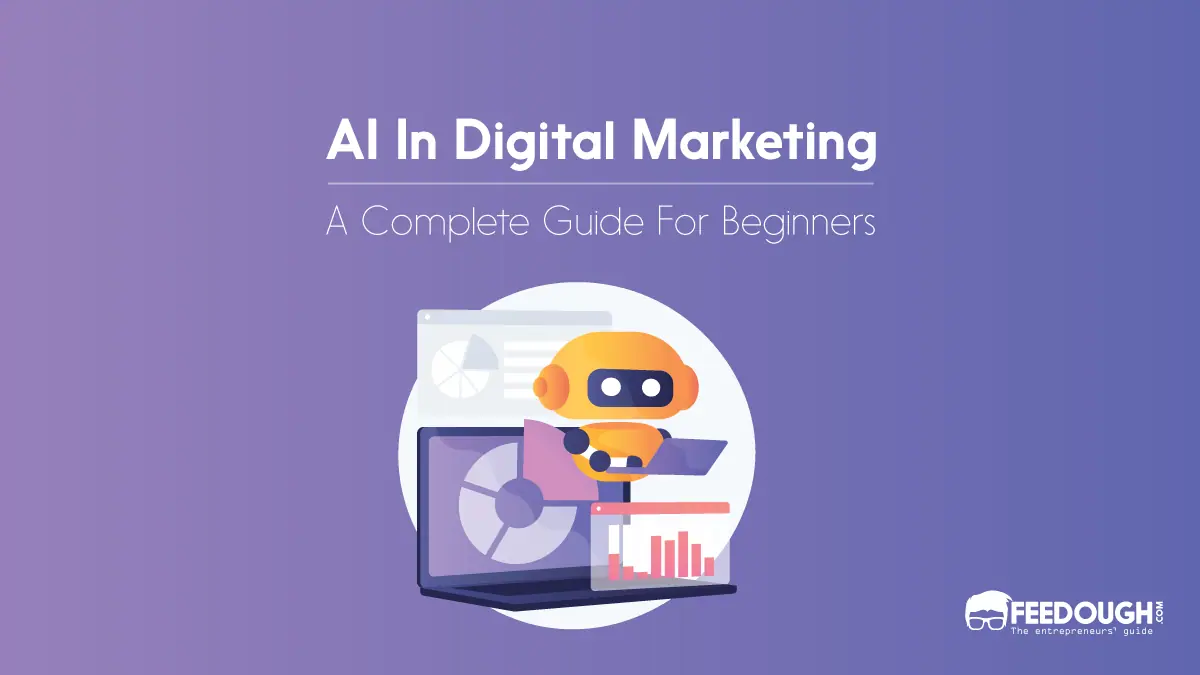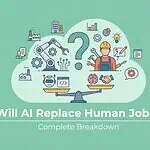Today, generative AI has disrupted almost every industry, but the first industry it impacted was digital marketing. From GPT helping writers create content to chatbots assisting customers on e-commerce websites, AI has become a secret weapon for many digital marketers.
There are cases where AI has even replaced human marketers, and it’s only a matter of time before AI becomes an integral part of every marketing strategy.
The Rise Of AI In Digital Marketing
AI in digital marketing refers to the use of artificial intelligence technologies to plan, execute, analyse, and optimise a company’s digital marketing efforts. This includes using AI-powered tools and platforms to automate tasks, predict consumer behaviour, analyse data, and deliver personalised experiences to customers.
It all began in the 1990s with the rise of the internet, where marketers began using AI tools for web analytics and email marketing.
The 2000s and 2010s saw a steady growth of AI use in digital marketing with –
- Launch of AdWords in 2000, where Google used AI to match ads to search queries.
- Facebook’s launch of its advertising platform in 2010, where it used AI for ad targeting and optimisation.
- Launch of IBM Watson in 2011 with its advanced NLP capabilities.
- Programmatic advertising becoming mainstream in 2014.
- Chatbots becoming widely adopted for customer queries in 2016.
But all this was just for big corporations or developers. The typical digital marketer was still far from using AI until 2020, when GPT-3 was launched.
GPT-3 was followed by generative AI tools like DALL-E and ChatGPT, which enabled the creation of content and ideas with minimal human intervention.
Today, with hundreds of available generative AI tools, digital marketers are able to:
- Create personalised content at scale: AI algorithms can now analyse consumer data and create personalised content that resonates with each individual, leading to higher engagement and conversion rates.
- Automate tasks: AI-powered tools can automate repetitive or time-consuming tasks such as social media scheduling, ad optimisation, and email marketing. This saves marketers time and allows them to focus on more creative aspects of their work.
- Predict consumer behaviour: With access to large amounts of data, AI algorithms can predict customer behaviour patterns and recommend the most effective strategies for reaching them.
- Monitor brand sentiment: AI-powered sentiment analysis tools scan social media platforms and other online channels to provide real-time insights into how consumers feel about a brand or product.
- Improve customer service: With the help of chatbots and virtual assistants, AI can handle basic customer queries and provide quick and accurate responses, improving overall customer satisfaction.
It’s not limited to just these use cases – AI is constantly evolving and finding new ways to improve the digital marketing landscape.
AI In Digital Marketing – Effects & Applications
Today, AI is present in almost every aspect of digital marketing. Let’s take a closer look at some of the key areas where AI is making a significant impact:
Content Marketing
Content marketing refers to the creation and distribution of valuable, relevant, and consistent content to attract and retain a clearly defined audience. It involves:
- Copywriting: goal-oriented writing used to persuade a reader to take action.
- Content creation: creating informative and engaging content in various formats such as blog posts, videos, infographics, etc.
- Content distribution: sharing content through different channels like social media platforms, email marketing, etc.
AI has the potential to enhance all aspects of content marketing by:
- Generating content ideas: AI-powered tools can analyse data and identify relevant topics for content creation. A simple prompt like “Give me blog ideas for an article about AI in digital marketing” to an advanced LLM like ChatGPT can generate several ideas for blog posts, social media posts, and more.
- Writing content: AI agents can now write high-quality, engaging articles using natural language processing (NLP) algorithms. For instance, the AI-powered tools Jasper and Copy.ai can generate human-sounding content for news articles, reports, and even product descriptions. This particular use case has led to the rise of several tech startups focusing on producing highly human-like content using AI.
- Improving content quality: AI can analyse the performance of existing content to identify what works and what doesn’t. It can then suggest changes or provide recommendations for better engagement.
- Personalising content: AI can use data about a target audience to create personalised content that resonates with them. For example, AI can analyse customer preferences and recommend specific products or services based on their past behaviour.
- Automating content distribution: With AI-powered tools, marketers can automate the distribution of content across different channels based on audience behaviour. This saves time and effort while ensuring maximum reach and engagement.
- Generating visual content: AI tools like Midjourney, ChatGPT, Stable Diffusion, etc., can generate high-quality, real-looking visuals such as images, videos, and infographics that are relevant to the content being created.
While AI can enhance content marketing in many ways, it is important to note that it cannot replace human creativity and storytelling. Human intervention is still required to guide and fine-tune the AI-generated content to align with brand voice and messaging.
But it does raise the question of what is next. While it has started replacing content writers, will it replace critical thinking jobs like media planning, buying, and strategy? While it can copy voice, what will replace podcasts? because AI still can’t replace the emotional aspect of any content—be it written, audio, or video. For example, podcasts became popular in the early 2020s just because they have a human touch, not because they provide any information like an audiobook.
Search Engine Optimisation (SEO)
SEO refers to optimising web content or web pages to improve their visibility and ranking on search engine result pages (SERPs).
With the rise of AI, search engines have become smarter in understanding user intent and delivering relevant results. As such, SEO strategies need to adapt to keep up with these changes. Let’s take a look at how AI is impacting SEO:
- Ranking factors: Search engines use algorithms to rank web pages based on keywords, backlinks, and site speed. AI-powered algorithms can analyse vast amounts of data to determine the most relevant results for a particular query.
- Search Results: Search engines like Google, Bing, Yep, etc., have now changed their UX to a chat format that provides quick and accurate answers to user queries. This is a change from traditional search results that require users to browse through multiple pages.
- Voice Search: With the rise of voice assistants like Alexa, Siri, and Google Assistant, voice searches have become increasingly popular. AI allows for better speech recognition and understanding of natural language queries, making it essential for SEO practitioners to optimise their content for voice search.
- Predictive Analysis: AI tools can analyse user data such as browsing history, location, and preferences to predict what a user may be searching for in the future. By leveraging predictive analysis, businesses can create content that is more likely to rank higher on SERPs and reach their target audience.
From a digital marketer’s perspective, AI is more of a boon than a bane. Here are some ways they can leverage AI for SEO:
- Keyword research: AI-powered tools like Google’s Keyword Planner, Surfer SEO, and SEMrush can help identify high-performing keywords and phrases to target in SEO campaigns. These tools use AI algorithms to analyse search volume, competition, and user intent to provide relevant keyword suggestions.
- Content creation: AI-powered content generators like Wordsmith, Articoolo, and Quill can help create content for blogs, product descriptions, and social media posts. These tools use natural language generation (NLG) to generate human-like text based on the input data.
- Content optimisation: AI-powered tools can analyse on-page elements such as headings, meta descriptions, and alt tags to suggest improvements for better SEO. They can also provide insights into content length, readability, and keyword density.
- Multi-language support: Generative AI makes it possible to translate content into multiple languages quickly and accurately, helping businesses reach a wider audience and improve their global SEO efforts.
- Link building: AI tools such as BuzzSumo, Pitchbox, and NinjaOutreach can streamline the process of finding relevant websites for link building. These tools use machine learning algorithms to identify high-quality sites based on domain authority, content relevance, and social media engagement.
Performance Marketing
Performance marketing refers to online advertising strategies in which advertisers only pay for specific actions, such as clicks, leads, or conversions. This approach is different from traditional advertising models, where advertisers pay for ad placement regardless of the results it generates.
AI has greatly impacted performance marketing by providing data-driven insights and automation tools that help businesses optimise their campaigns and increase ROI. Here are some ways AI is transforming performance marketing:
- Optimising ad spends: AI-powered tools like Acquisio and Kenshoo use machine learning algorithms to adjust bids in real-time based on the conversion probability of a particular keyword or audience segment. By analysing historical data, they can allocate ad budgets more efficiently, reducing wasted spend and increasing overall ROI.
- Personalising advertising: With AI, businesses can create highly targeted and personalised ads based on user behaviour, demographics, and interests. This not only improves the effectiveness of the campaign but also enhances the user experience by providing relevant content.
- Ad content generation: There’s a rise in the number of AI ad generators like Rytr, and AdZis that use natural language processing (NLP) to generate ad copies based on a given input. This makes it easier for businesses to create multiple ad variations with minimal effort and time.
- Improving targeting accuracy: AI-powered tools like Google’s Smart Display Campaigns and Facebook’s Lookalike Audiences use machine learning to analyse user data and identify patterns that can help businesses target the right audience with their ads. This leads to higher conversion rates and reduces ad spend wastage on irrelevant audiences.
- Predictive analytics: By analysing large datasets, AI tools like Optimizely can predict the success of future campaigns and provide insights on which channels, audiences, and messaging will perform best. This allows businesses to make data-driven decisions and optimise their campaigns for maximum ROI.
- Automated A/B testing: Traditional A/B testing involves manually creating variations of an ad and measuring its performance. With AI-powered tools like Adext, businesses can automatically create multiple versions of an ad using different elements (images, headlines, CTAs) and test them simultaneously. This saves time and resources while providing more accurate results.
Social Media Marketing
Social media marketing is the use of social media platforms to promote a product or service. With the ever-growing popularity of social media, it has become an essential aspect of digital marketing for businesses.
Here are some ways AI is revolutionising social media marketing:
- Content creation: AI-powered tools like Canva, Adobe Sensei, and Microsoft Designer use machine learning to automatically generate and personalise social media posts based on a brand’s style and target audience. This reduces the time and effort required for content creation while maintaining consistency.
- Chatbots: Chatbot technology is becoming increasingly popular in social media marketing. Tools like Manychat and Chatfuel use AI to automate conversations with customers on social media platforms, providing them with information, addressing inquiries, and even completing transactions. This improves customer service and frees up time for businesses to focus on other tasks.
- Influencer marketing: AI tools like Traackr and Upfluence use advanced algorithms to identify the most relevant influencers for a brand’s target audience. This saves businesses from manually searching for influencers and helps them reach their target market more effectively.
- Sentiment analysis: AI-powered sentiment analysis tools like Brandwatch and Talkwalker analyse social media posts, comments, and reviews to gauge public opinion about a brand. This helps businesses understand their customers’ feelings towards their products or services and make necessary improvements.
Email Marketing
Email marketing refers to the use of email to promote products, services, or brands to potential customers. With AI technology, email marketing has become more sophisticated and effective.
While email marketing has been around for a long time, AI is bringing new capabilities to this traditional form of digital marketing. Here are some ways AI is revolutionising email marketing:
- Personalisation: AI-powered tools like Marketo and Salesforce Einstein use data and machine learning to personalise email content based on a subscriber’s behaviour, preferences, and demographics. Some tools like smartwriter.ai even personalise the emails using the prospects’ social media profiles, making the content more relevant and engaging.
- Optimisation: Tools like Phrasee and Persado use natural language processing (NLP) algorithms to optimise subject lines and email copy for better open rates, click-through rates, and conversions. This eliminates guesswork in email marketing and helps businesses send more effective campaigns.
- Segmentation: AI-powered segmentation tools like Optimove and SendX use data analysis to segment subscribers based on their interests, behaviour, and demographics. This allows businesses to send targeted emails to specific groups of subscribers, increasing the chances of conversion.
- Automated campaigns: AI automates email marketing campaigns by analysing customer data to determine the best time, frequency, and type of email to send. This helps businesses save time and effort while delivering targeted messages to their audience.
Influencer Marketing
Influencer marketing refers to the practice of using influential individuals or personalities to promote a brand’s products or services. With the rise of social media, influencer marketing has become an increasingly popular strategy for businesses looking to expand their reach and increase brand awareness.
AI is now being used in influencer marketing to identify the most relevant and effective influencers for a particular campaign.
AI-powered tools like Upfluence and Traackr use data analysis to identify the best influencers for a brand based on their audience demographics, engagement rates, and past collaborations. This eliminates the manual process of searching for and vetting potential influencers, saving businesses time and resources.
And it’s not just limited to tracking. AI is the influencer now. Several digital influencers are AI-generated personas with a large following on social media platforms.
AI influencers like Giorgina Aleman, Miquela, and Shudu Gram have amassed millions of followers and collaborated with major brands, showcasing the potential of AI in influencer marketing.
These AI influencer accounts are created and managed by companies like Brud or individuals who make money from their AI creations.
Marketing Analytics
Marketing analytics involves collecting, tracking, and analysing data to evaluate marketing strategies and measure their effectiveness. AI has greatly enhanced the capabilities of marketing analytics by processing large volumes of data at a faster rate and providing actionable insights for businesses.
Here is how AI is revolutionising marketing analytics:
- Real-time Data AnalysisReal-time Data Analysis: AI tools like Microsoft Clarity (with Copilot) and Google Analytics use machine learning algorithms to track and analyse customer behaviour in real-time.
- Data visualisation: AI-powered data visualisation tools like Tableau and Power BI help businesses visualise complex data sets, making it easier to identify patterns and trends. IBM Watson Analytics uses natural language processing to generate visualisations and dashboards, making it easier for non-technical users to interpret data.
- Predictive analytics: AI-powered predictive analytics tools like Salesforce Einstein and SAP Analytics Cloud use machine learning algorithms to forecast future trends and identify potential opportunities or challenges.
Web Design and Development
Web design refers to the process of creating and designing websites, while web development involves building and maintaining websites.
AI has greatly impacted both these areas by enhancing the speed, accuracy, and personalisation of website design and development.
Here are some ways AI is transforming web design and development:
- Smart Templates: AI-powered website builders like Wix and Squarespace use machine learning algorithms to suggest personalised templates based on the user’s preferences and needs. This saves time and effort in the design process.
- AI-powered website builders: Several tools like 10web and ZipWP use AI to generate websites automatically, eliminating the need for coding. All the user needs to do is fill out a form with their requirements, and the AI tool does the rest.
- Personalisation: With AI, websites can be personalised based on user behaviour and preferences. This means that each visitor will see a unique version of the website tailored to their interests, increasing engagement and conversions.
- Chatbots: AI-powered chatbots can handle customer inquiries and provide support, freeing up resources for web designers and developers. They can also be used to gather user feedback and improve the website.
- AI-assisted coding: LLMs and tools like Codestral, Cursor, and TabNine use AI to suggest code snippets, auto-complete functions, and debug code errors. This saves time and improves the accuracy of coding.
- Dynamic Content: AI can generate dynamic content for websites based on real-time data, such as weather conditions or user location. This makes the website more relevant and engaging for visitors.
Marketing Automation
Marketing automation refers to the use of technology and software to automate marketing processes, such as lead generation, email marketing, and social media management.
Tools like Make.com, Marketo, and HubSpot use AI to automate marketing tasks and create personalised campaigns based on user data.
For example, a user can create a simple flowchart for an email marketing campaign, connecting different AI-powered and non-AI-powered tools to send personalised emails based on user behaviour and engagement.
Similarly, a user can set AI-powered triggers for social media posts based on specific keywords or hashtags. All of this can be done without the need for manual intervention, saving time and increasing efficiency.
Marketing automation with AI also allows for better tracking and analysis of marketing campaigns. As AI collects and analyses data in real-time, it can provide insights into what is working and what needs to be improved. This helps businesses make more informed decisions about their marketing strategies, resulting in better ROI.
A startup consultant, digital marketer, traveller, and philomath. Aashish has worked with over 20 startups and successfully helped them ideate, raise money, and succeed. When not working, he can be found hiking, camping, and stargazing.









